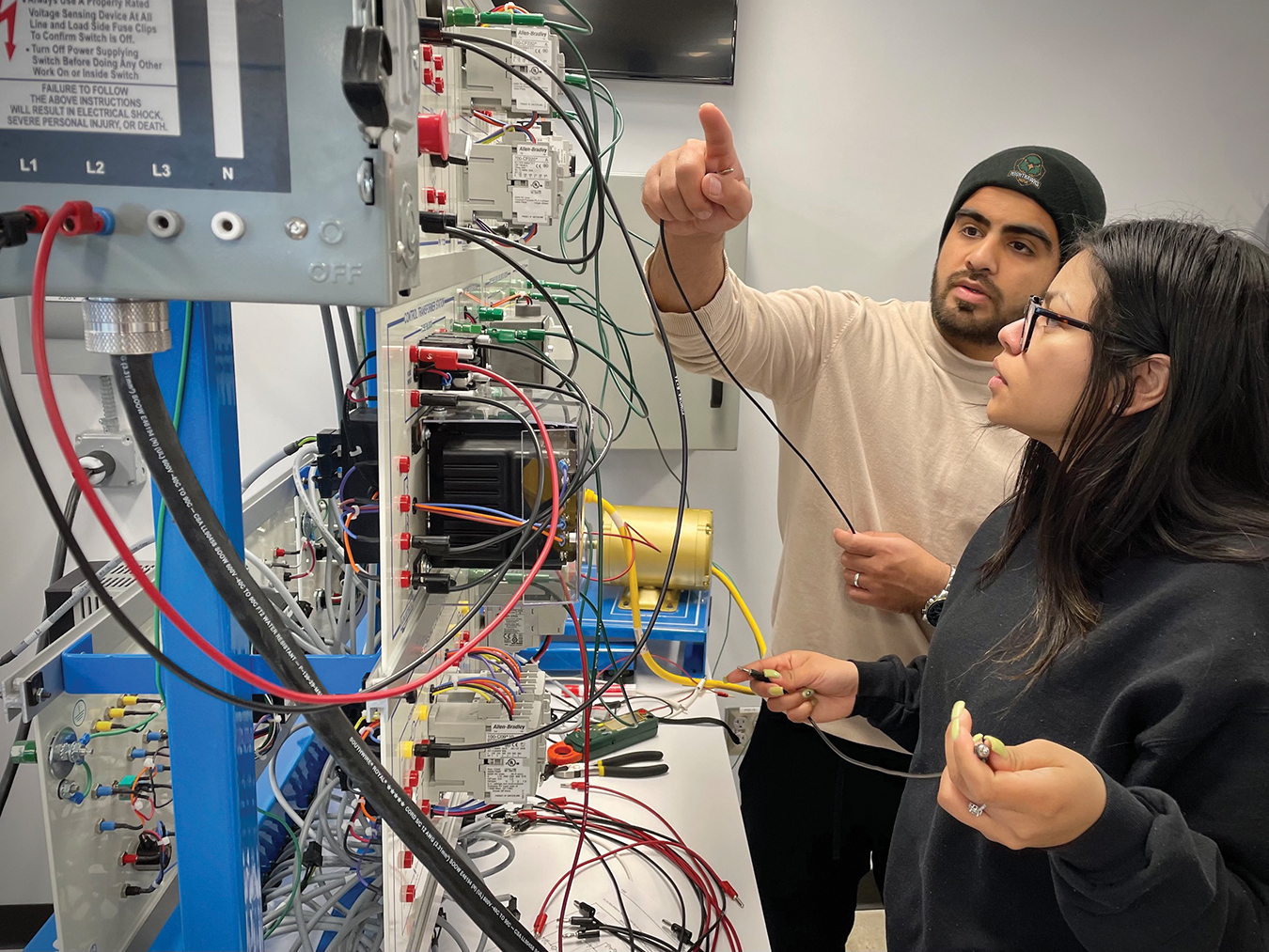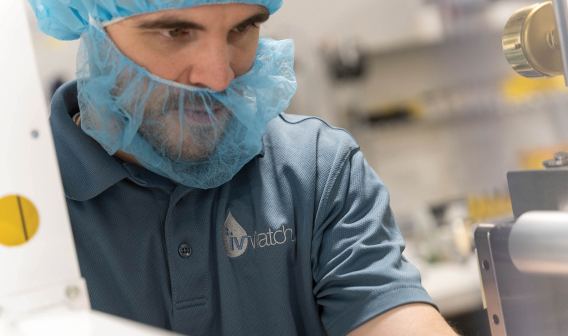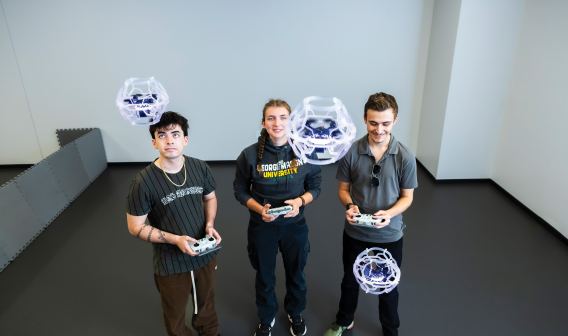Building Certainty Into Virginia’s Quantum Workforce Pipeline
The quantum age is rapidly approaching. So rapidly, in fact, that any approach to developing a workforce must account for the changes happening at the speed of light as quantum science shifts from theoretical to practical application.
That is one goal driving the Potomac Quantum Innovation Center (PQIC), an arm of regional collaboration nonprofit Connected DMV that’s dedicated to bringing together knowledge, resources, and industry across the Washington, D.C., area to cement the region’s status as one of the top quantum regions in the world. “The core of our mission is to look five to 10 years ahead, imagine what that future looks like for industry, and then work to make that happen,” said George Thomas, Connected DMV’s chief innovation officer.
In Northern Virginia, building this future has led to workforce development efforts that span training for today’s industrial executives all the way to the integration of quantum concepts into pre-kindergarten curriculum. Connected DMV’s NEXTversity program is supporting higher education institutions, K-12 public schools, and emerging lab schools in determining how best to develop skill sets for roles that may not yet exist.
For individuals already in the workforce, NEXTversity program leaders are exploring pathways to credentials that could support future quantum computing needs, for example. “Because of how fast industry and the types of skills required are evolving, traditional educational pathways are just not enough to sustain and build workforce and talent,” Thomas said. NEXTversity seeks to bridge training gaps by ensuring today’s workforce is able to gain new skills to support quantum-focused organizations.
When it comes to those support positions, Dr. Chad Knights, vice president, information & engineering technologies and college computing for Northern Virginia Community College (NOVA), sees a few specific pathways emerging. Alongside the highly educated theoretical physicists who will develop new quantum models, he expects a demand for engineers who can build future quantum computing systems and a technician workforce to maintain and operate those systems.
“We have a very strong foothold in the operator technician space,” Knights said. He notes that this strength comes out of the work the college has done with companies like Micron Technology, which produces memory products in Manassas, and BAE Systems, which is exploring quantum sensing in Fairfax County and currently operates in Manassas creating advanced technology for space operations.
“The focus there is around advanced manufacturing and building automation, which rely on the same set of core technical skills that will be needed by the future workforce to operate and maintain quantum computers,” Knights added. “As an example, these [quantum] computers must be supercooled. Technicians will have to deal with a similar set of mission-critical system and technology requirements but with an added focus on supercooling.”
Knights notes that students moving into these roles may not need to learn quantum mechanics, “but they still must understand the principles instilled in quantum computing so that they can apply that logic when we’re thinking about the technology.” To support this thinking, NOVA is working to add topics around photonics and optics into their curriculum to bridge the theoretical understanding of quantum to practical models. “We’re also trying to figure out how we build a pipeline of talent to support the future quantum workforce,” Knights added.
PQIC’s K12 Quantum Workforce Development Project is already developing that pipeline. Led by George Mason University’s Quantum Science and Engineering Center (QSEC), the project is helping school systems in Loudoun and Fairfax counties train educators and develop curriculum that will lay the foundation for tomorrow’s quantum workforce.
Backed by a U.S. Department of Education grant, QSEC runs several quantum education programs, including “Pathways to Quantum Immersion,” which helps high schoolers learn about quantum technology and careers, and “Quantum in Your Classroom,” aimed at helping K-12 teachers incorporate quantum topics into their classrooms.
This year, students met quantum leaders at institutions including NASA’s Goddard Space Flight Center, the White House Office of Science and Technology Policy, the Joint Quantum Institute within the National Institute of Science and Technology, and MITRE Labs. The high school students also met undergraduate and graduate students currently studying quantum science at George Mason. At the close of the program, students complete summer projects with the opportunity to present them at the 2023 Quantum World Congress in Fairfax County. QSEC faculty were also recently funded to research quantum education in elementary classrooms through a National Science Foundation grant.
“For our students at the Academies of Loudoun [a specialized program for STEM-focused education], there’s a whole wide range of opportunities outside of the typical program of studies. Those students have been engaging in quantum within physics and math classes for a couple of years now,” said Nicholas Grzeda, computer science supervisor for Loudoun County Public Schools. Now, the county is looking bigger by hiring a computer science resource teacher whose focus will be to bring quantum more proudly into all schools across the county.
Alexandra Fuentes, program manager, STEAM and computer science for Fairfax County Public Schools, adds that the counties are looking at opportunities on the entire continuum from pre-K through high school. The goal is to spark student interest early and provide a strong foundation on which to move into postsecondary pathways and careers.
“We already have really strong computer science and engineering elective course pathways, which include specialized courses in quantum science, AI, cloud computing, cybersecurity, and other topics tied with high-demand career fields,” Fuentes said. In addition to increasing access to those courses, Fuentes is working to integrate quantum concepts into traditional coursework.
For example, educators can teach the concept of superposition to elementary students through comparisons to how people can experience multiple emotional states in a single moment. Another experiment for elementary students teaches how the act of measurement can change the state of the item being measured by measuring the flavor of jelly beans.
“It’s about fostering curiosity and wonder and letting students explore real problems,” Fuentes said. “When we can connect our students with possibilities for the future, and tap into their creativity and the questions they might ask and the things they’re interested in, and help them see the careers paths that are here for them earlier — that’s life-changing.”





